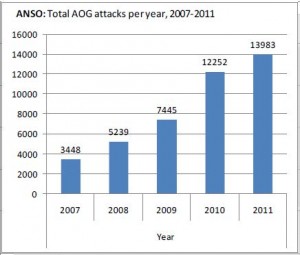McCain, Lieberman and Graham Attempt to Revive Mass Delusion on Afghan “Success”
In yesterday’s post, I pointed out the craven political decision to delay a strategic reassessment of the war strategy in Afghanistan until after the election in November. Just in case that was not enough stupidity already emanating out of Washington regarding Afghanistan, today we have the collected wisdom of John McCain, Joe Lieberman and Lindsey Graham informing us that not only is there success in the war effort in Afghanistan, but the US must listen closely to them in order to sustain that success. In preparation for reading the recommendations from our trio of uninvited experts, it is useful to look once again at the accompanying chart, where we see the steady increase in violent events in Afghanistan. The surge of troops in early 2010 did not reverse the trend of increasing violence. In fact, violence jumped by an even larger amount in the first year of the surge than in previous years. No benefit of the surge accrued in 2011, either, as the number of violent events continued to increase.
But McCain, Lieberman and Graham would have us believe that there is “success”:
Significant military progress has been made in Afghanistan — progress that we have personally witnessed over repeated visits. Four years ago, southern Afghanistan was overrun by the Taliban, and our coalition lacked the resources and the strategy necessary to break their momentum. Today, that situation has been reversed, thanks to the president’s surge of forces, the leadership of talented military commanders, and the courage and perseverance of our troops.
Similarly, our effort to build the Afghan National Security Forces — which was under-resourced and disorganized four years ago — has been overhauled. Growing numbers of Afghan units are increasingly capable of leading the fight.
Of course, given the current clusterfuck that is reality in Afghanistan, our mentors of mendacity were forced to open their piece with a nod to the growing desire by most Americans to get out sooner rather than later:
A series of tragic events in Afghanistan has increased the desire of a war-weary public to end our mission there. As heart-wrenching as these events have been, they do not change the vital U.S. national security interests at stake in Afghanistan, nor do they mean that the war is lost. It is not. There is still a realistic path to success if the right decisions are made in the coming months.
And just what is the “realistic path to success” that is being offered for our consideration? Well, more of the same, of course. We can’t possibly let troop numbers fall below 68,000 in September, because this “would guarantee failure”. Further strategic advice is that we can’t create the impression that the US will abandon Afghanistan. And to prevent that belief, McCain, LIeberman and Graham tell us that the US must complete the second half of the strategic partnership agreement. The first half, which Graham took on alone by stomping his foot over when control of prisons would be handed over, was signed two weeks ago. The second half of the agreement will deal with the sensitive issue of night raids. Night raids were also a part of Graham’s tantrum earlier. He simply can’t abide by the idea of an Afghanistan without night raids. So it is not surprising, then, that Lindsey would have brought in John and Joe to help him try to keep night raids going:
We are optimistic that a similar resolution can be found soon regarding the gradual transfer of the lead for “night raids” to Afghan forces. Already, Afghans increasingly lead these operations. The success rate is overwhelming, and in most cases no shots are fired.
And those pesky Afghan citizens will just have to ignore the times when the raids are poorly targeted and shots are indeed fired. Never mind that Afghan President Hamid Karzai has been insisting for years that night raids end altogether or that night raids incite violent reprisals, our unappointed leaders of the war effort insist that the raids must continue at all costs.
It seems likely that this mass delusion that we have succeeded in Afghanistan will be shared widely in Washington, as Hilary Clinton is assuring us that the strategic partnership agreement will be signed prior to the NATO summit in Chicago in May. And Hamid Karzai is already counting the dollars that will continue to flow into Afghanistan once the troops are mostly gone. I’d gladly jump on board with that delusion if only the timetable could be greatly accelerated. We spent around $120 billion in Afghanistan last year, so the post-drawdown $4 billion Karzai is anticipating is quite a bargain. There simply is no reason to be as slow as Obama’s current plan for the drawdown in troop numbers. Sadly, by stating that an accelerated drawdown “would guarantee failure”, McCain, Lieberman and Graham have guaranteed a large number of pointless deaths for our troops and Afghan civilians. Given Obama’s previous decisions on Afghanistan, he seems likely to have been caged in by this framing and almost certainly will “choose” a very slow drawdown when he finally reassesses strategy at the the end of the year.
